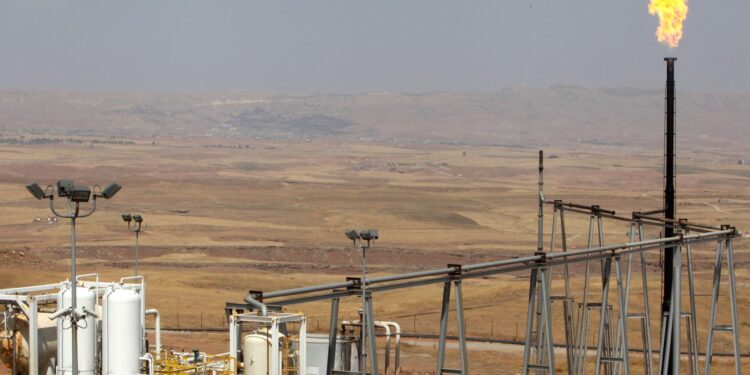Farhad Aladdin, advisor to the Iraqi Prime Minister, told Reuters – today, Saturday, that Baghdad denies reports that the country may face US sanctions if oil exports are not resumed from the Kurdistan region.
Aladdin said that “there is no truth to media reports that claim that there are threats to impose sanctions on Iraq in the event that oil exports are not resumed from the Kurdistan region.”
“In all the contacts that took place with the American administration recently, there was no threat to impose sanctions or any form of pressure on Iraq,” he added.
On Friday, 8 informed sources told Reuters that the administration of US President Donald Trump is pressuring the Iraqi government to allow oil exports to resume from the Kurdistan region of Iraq to global markets through Turkey, or to face sanctions alongside Iran.
This comes within the framework of Washington’s “maximum pressures” policy on Tehran, which aims to tolerate Iranian oil exports and isolate them from the global economy, according to Reuters.
The Iraqi Oil Minister had announced – suddenly – that exports from Kurdistan will resume next week, after a two -year hiatus that led to the break of supplies of 300 thousand barrels per day that reached global markets through Türkiye.
8 sources from Baghdad, Washington and Erbil reported that the increasing pressure from the Trump administration was the main reason behind this announcement, but the details of the technical treatment of the obstacles facing the appeal.
The tension is increasing
Tehran, Iraq is a major ally in supporting its affected economy, but Baghdad, which is an important partner for the United States, is afraid that it will be subjected to American pressure because of its relationship with Iran, according to Reuters.
The sources stated that Washington asked Iraqi Prime Minister Muhammad Shi’a Al -Sudani to cut economic and military relations with Iran. Reuters also confirmed that the Central Bank of Iraq prevented 5 private banks from obtaining the dollar after a request from the US Treasury.
An Iraqi official familiar with the cargo operations to Iran said that Washington is pressuring Baghdad to ensure the export of Kurdish oil to global markets through Türkiye instead of selling it at low prices to Iran.
Artistic obstacles
Türkiye stopped the pipeline in March 2023 after the International Chamber of Commerce’s decision to compel Ankara to pay $ 1.5 billion in compensation for Baghdad for unauthorized exports between 2014 and 2018.
Reuters reported that several cases are still pending, including the payment mechanism, oil pricing, and line maintenance, as there was no agreement in the recent meetings between Baghdad and Erbil.
An informed source indicated that the Iraqi government wants to resume exports without providing financial obligations to the Kurdistan Regional Government, which raises concerns among the oil companies operating there.
The Norwegian company executives said that they will not agree to resume exports before confirming the payments mechanism and restoring $ 300 million for previous deliveries before the pipeline was closed.
The resumption of exporting oil from Kurdistan may cause problems within the OPEC Plus coalition, as Baghdad is under pressure to adhere to its productive share in the framework of the production reduction agreement.
According to Giovanni Stonovo, commodity analyst at UPS, the total impact of the resumption of the line may be limited, because Iraq is committed to its productive share inside OPEC Plus, which means that it will not pump additional quantities to the market, but will only redistribute its exports.
In this context, Oli Hansen, head of the commodity strategy sector in Saksu Bank, said that the resumption of Kurdistan’s exports may help compensate for the deficiency in supplies resulting from production failure in Kazakhstan, after the recent Ukrainian attack on a pumping station in southern Russia.
Increasing
Since Trump returned to the White House in January 2025, Washington has resumed the “maximum pressure” campaign on Iran, as Trump ordered the US Treasury Secretary to ensure Iran’s inability to use the Iraqi financial system.
According to US officials, the resumption of oil exports from Kurdistan will help reduce pressure on global markets, especially with the possibility of a sharp decline in Iranian oil exports, which may lead to high oil prices globally.
A White House official said: “It is not important for regional security only to allow our Kurdish partners to export their oil, but also to maintain the stability of fuel prices globally.”



